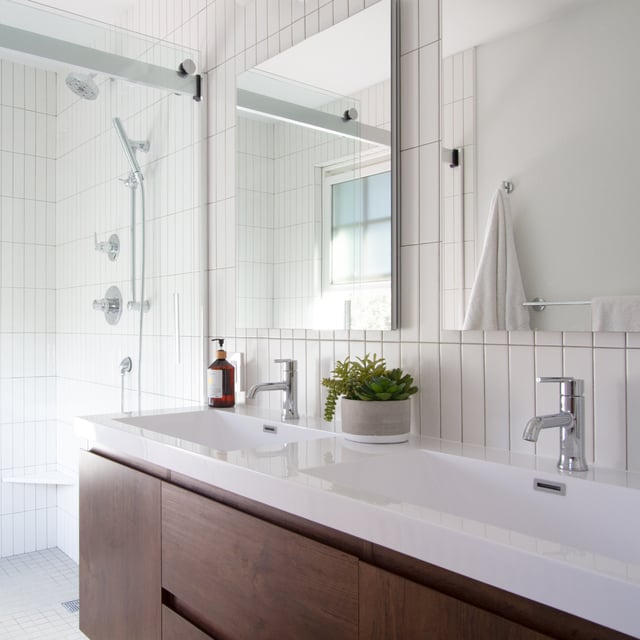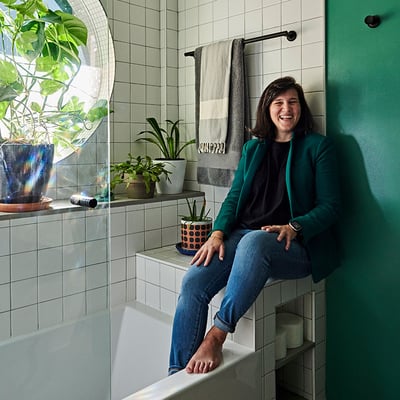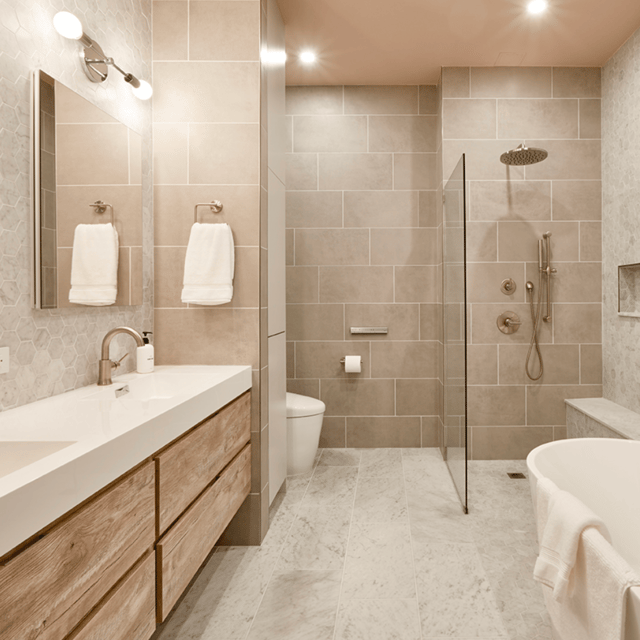
Bathroom
Bathroom Mirror Trends to Inspire Your Ideas
01.07.2026
Our New Year savings event is here: Get up to $6,500 off your project today (terms apply).


In This Article
Renovating your bathroom can breathe new life into one of the most functional rooms in your home. Whether you're dreaming of a spa-like retreat or simply trying to upgrade a small powder room, the possibilities are endless. But before you jump into selecting tile patterns and shopping for new fixtures, there's one critical question every homeowner in Chicago must ask: How much does a bathroom remodel cost?
The truth is that bathroom renovation costs can vary dramatically, influenced by factors such as the size of the bathroom, the materials you choose, and, of course, labor costs. However, this guide will take you through everything you need to know about budgeting for a bathroom remodel in Chicago, from basic updates to high-end renovations. Along the way, we'll explore how various factors like finishes, labor, and flooring can significantly impact the overall price.
So, if you're wondering what it costs to remodel a bathroom, what factors contribute to those costs, and whether you can save money by doing it yourself, keep reading. By the end of this guide, you'll clearly understand what to expect and how to plan for your bathroom renovation project.
Bathroom remodels in Chicago can range from modest upgrades to luxury overhauls, and understanding your budget is key to planning the renovation of your dreams. Here, we break down the costs into three basic categories—budget, mid-grade, and high-end renovations—so you can find the range that fits your project.
If you're trying to keep costs down, a budget bathroom remodel in Chicago typically starts at around $16,000. This type of renovation is perfect for smaller bathrooms or powder rooms where you don't need extensive changes. Budget remodels usually focus on replacing essential fixtures like the toilet, sink, and vanity, along with repainting or retiling for a fresh look.
In a budget remodel, you're likely working with stock fixtures and materials, such as standard tile or vinyl flooring and prefabricated vanities. These materials offer a significant aesthetic improvement without the cost of custom work. While it might not be the most luxurious renovation, a budget bathroom remodel can completely transform a dated or dysfunctional space into something fresh and new.
Renovate with confidence every step of the way
Step 1: Personalize Your Renovation Plan
Step 2: Receive Quotes from Trusted Contractors
Step 3: Let Us Handle the Project Details

A mid-grade bathroom remodel typically costs around $26,000 and can go up depending on your chosen features and finishes. If you're looking for higher-quality materials and fixtures, this is the sweet spot between affordable and luxury. Mid-grade remodels may include semi-custom vanities, upgraded tile options, quartz countertops, or modern plumbing fixtures.
This category is ideal for full bathrooms, including the guest bath or primary bathroom, where you want a more refined design without going full luxury. You might also include extras like improved lighting, better storage solutions, and upgraded finishes on the faucets or shower fixtures.
For those with a larger budget and a desire for luxury, a high-end bathroom remodel starts at $36,000 and can climb well beyond that, depending on the level of customization and high-end materials you choose. In this range, you're likely looking at premium finishes, custom cabinetry, natural stone countertops, luxury fixtures, and even layout changes that might involve moving plumbing or electrical work.
High-end bathroom remodels can include features like a walk-in shower with multiple showerheads, a freestanding bathtub, heated floors, and designer lighting. These bathrooms are not just functional spaces—they're luxurious retreats designed to offer a spa-like experience in the comfort of your home.

While the size of your bathroom and the finishes you choose are the most obvious factors influencing your renovation costs, several other elements must be considered. Each one can add to the overall price, and understanding these factors can help you make smart decisions during the renovation process.
The size of your bathroom is one of the most significant factors affecting the cost of your renovation. Larger bathrooms require more materials, labor, and often more complex installations, which can all drive up costs. Below, we break down how the size of different bathrooms impacts the price.
Half bathrooms (powder rooms)
Half bathrooms, also known as powder rooms, typically contain just a toilet and a sink, making them the smallest and most affordable bathroom to renovate. A simple update might cost around $5,000, but a more involved renovation, with upgraded fixtures and finishes, could range between $10,000 and $15,000.
The key to having half baths is to maximize space. Since there's no shower or bathtub, you can upgrade the sink, toilet, and flooring. Adding bold tiles or wallpaper can make a big statement in a small space without a huge budget.
Full bathrooms
Full bathrooms are significantly more expensive than half baths because they typically include a toilet, sink, bathtub, or shower (sometimes both). This is where the costs can start to add up. In Chicago, a full bathroom remodel might start around $16,000 for a basic update, but depending on the quality of materials and finishes you choose, it can easily climb above $30,000.
Full bathrooms require more materials—think tile for the shower, possibly a new bathtub, and more square footage of flooring and walls to cover. If you're looking to reconfigure the layout, add storage, or install new lighting, these will also affect the price.
Primary bathrooms (master bathrooms)
Primary bathrooms (also referred to as master bathrooms) are typically the largest and most complex to renovate. They often include dual vanities, a separate shower and bathtub, and additional storage space. For a high-end primary bathroom remodel, costs can start at $36,000 and quickly exceed $50,000, especially if you incorporate luxury finishes, custom cabinetry, and high-end fixtures.
These bathrooms offer a lot of flexibility in design. You can create a spa-like atmosphere with a steam shower, heated floors, a freestanding tub, and even smart technology like digital faucets or lighting. However, with all these features come increased costs, particularly if you're reconfiguring the layout or moving plumbing and electrical components.

The finishes you select—like the type of tile, countertops, and fixtures—can greatly impact your overall budget. Here's how different levels of finishes can change the cost of your bathroom remodel.
Budget finishes
If you're working on a budget, sticking with basic, affordable finishes will help keep costs down. This might include ceramic or subway tile, laminate countertops, and prefabricated vanities. These materials offer a clean, modern look but won't break the bank.
Budget finishes are ideal for guest bathrooms, half baths, or situations where you're renovating to sell your home and don't want to overspend. You can still create a stylish and functional space with budget finishes; just be aware that they won't have the durability or long-term appeal of higher-end options.
Mid-grade finishes
In the mid-grade range, you have a lot more options. Porcelain or ceramic tiles, quartz countertops, and semi-custom vanities are common. Fixtures might include more durable finishes like brushed brass or matte black, and you may also opt for some upgraded lighting or plumbing features.
Many homeowners choose this option for full bathroom remodels, striking a balance between quality and cost. Mid-grade finishes offer durability and aesthetic appeal without the high price tag of luxury materials.
High-end finishes
For those looking for a more luxurious feel, high-end finishes can dramatically elevate the look of your bathroom. Think marble or glass tile, natural stone countertops, and custom cabinetry. Fixtures might include designer brands like Kohler or Hansgrohe in unique finishes like rose gold or polished brass.
In addition to aesthetics, high-end finishes often provide better durability, longer warranties, and a premium look that can significantly increase your home's value.
Luxury Finishes
At the very top end of the spectrum, luxury finishes include the finest materials and the most cutting-edge technology. A luxury bathroom remodel can include heated floors, smart showers, custom lighting systems, and even voice-activated faucets. Custom-designed tile mosaics, bespoke vanities, and imported materials might also be featured.
If you're building your dream bathroom and are willing to spare no expense, the sky's the limit for luxury finishes.
Get matched with Block-vetted Chicago contractors

Mark
MRCR DBA Quality Contracting 4.5

Ion
Art Deco Enterprises 4.6

Alberto
XP Contractors Inc 5.0

Isli
SABI Construction USA Inc 5.0

Sanuar
A Better Plus Construction Inc 4.6

Sara and Ernesto
American Precision Developers LLC 4.8

Mladen
Petarson Renovations 5.0

Elias
Big Foot Contracting 4.5

Steven
Terranova Construction 5.0

Gad
Golden State Designs 4.9

Leonardo
Andes Project Contractor Corporation 4.5

Juan
Fancy Construction 4.9

Joseph and Anca
QB Construction Inc 5.0

Piotr
Peter Renovations Inc 4.8

Harold
AAA Construction Services, LLC 5.0
The materials you choose for your bathroom renovation will greatly impact the overall cost. From flooring to countertops, here's what you can expect to spend on various materials:

Labor costs make up a large portion of the overall budget for any bathroom remodel. On average, labor costs can range between 40% and 60% of the total project cost. This includes everything from demolition and plumbing to electrical work and tile installation.
Plumbing and electrical
Moving plumbing or adding new fixtures can significantly increase labor costs. If you're reconfiguring your bathroom layout, expect to pay more for skilled labor to move pipes, install new drains, or rewire the electrical system. These are tasks best left to professionals, as poor installation can lead to costly repairs down the road.
Tile installation
Tile installation is another labor-intensive part of a bathroom remodel. Custom tile work, such as intricate designs or mosaics, can take hours or even days to complete, adding to the overall labor cost. On average, tile installation costs between $5 and $15 per square foot, depending on the complexity of the design.
General contractor
Hiring a general contractor to oversee the project is often a good idea, especially for larger or more complex renovations. A general contractor will coordinate with plumbers, electricians, and tile installers, ensuring that the project runs smoothly. General contractors typically charge a percentage of the total project cost, often between 10% and 20%.
Turn your renovation vision into reality
Get matched with trusted contractors and start your renovation today!
Find a Contractor
The type of flooring you choose for your bathroom will significantly impact your overall budget. Here's a breakdown of common flooring materials and their costs:
Replacing a bathtub or shower is one of the most significant expenses in a bathroom remodel, as we explore more in this guide. The cost will vary depending on the installation's size, material, and complexity.
Bathtubs
Showers

DIY bathroom renovations can save you significant money, particularly on labor costs, which can make up a large portion of the budget. However, taking on a bathroom remodel yourself comes with its own set of challenges.
While DIY projects can save you money upfront, they also come with risks. If something goes wrong, it can cost you more in the long run to fix the problem. For example, a poorly installed shower pan can lead to water leaks and mold growth, which may require a complete renovation down the road. Make sure you're confident in your skills before taking on a major DIY project.
Compare Proposals with Ease

Choosing the right Chicago contractor is critical to ensuring your bathroom renovation goes smoothly. Here are some tips to help you find the best contractor for your project.
Start by researching online and asking for recommendations from friends or family who have recently renovated their bathrooms. Look for contractors specializing in bathroom remodels and have experience working on similar projects.
It's essential to make sure your contractor is licensed and insured. In Illinois, contractors must be licensed to perform certain types of work, including electrical and plumbing. Insurance is also crucial, as it protects you from liability if someone is injured during the renovation or if your home is damaged.
Not all bathrooms are the same. A contractor who has only completed cosmetic updates on powder rooms may not have the experience needed to fully gut a bathroom or build a brand-new one in your Chicago basement. Likewise, a remodeler who has worked exclusively on new construction might not be equipped to handle the unique challenges of older plumbing and materials found in historic homes. When interviewing candidates, ask them to share specific examples of Chicago bathroom projects they’ve completed that are similar to yours.
Getting at least three quotes from different contractors before deciding is always a good idea. This will help you better understand the average bathroom remodel cost and avoid being overcharged. Be sure to ask for a detailed breakdown of the costs in each quote so you can see exactly where your money is going.
A reputable contractor should be able to provide references from previous clients. Contact these references to ask about their experiences and whether they were satisfied with the work.
Once you've chosen a contractor, it's essential to have a clear contract outlining the project's scope, timeline, and payment schedule. This will help prevent misunderstandings and ensure everyone is on the same page.
Renovating your bathroom can be a rewarding investment in your home's comfort and value. Whether doing a small bathroom remodel, tackling a larger primary bathroom renovation, or working with a limited budget, understanding the various factors that impact the cost will help you make informed decisions. In Chicago, bathroom remodeling costs can vary widely. Still, by carefully considering your size, materials, finishes, and labor choices, you can create the perfect bathroom that fits both your vision and your budget.
So, how much does it cost to remodel a bathroom in Chicago? The answer depends on your specific needs and preferences. But with this guide, you're now well-equipped to start planning your project, whether you're going for a budget-friendly update or a high-end spa-like retreat. Whatever your goals, a well-executed bathroom renovation can enhance both your daily routine and your home's overall appeal.
Design a Home That’s Uniquely Yours
Block can help you achieve your renovation goals and bring your dream remodel to life with price assurance and expert support.
Get Started

Written by Jordi Lippe-McGraw
Jordi Lippe-McGraw
What is the cost of installing new bathroom fixtures?
What are the costs associated with moving plumbing in a bathroom renovation?
How much does it cost to upgrade bathroom lighting?
How much does it cost to install a new vanity or sink?
How much does it cost to install underfloor heating in a bathroom?
How much does it cost to install a new toilet?
What should I do to prepare for my bathroom renovation?

Renovate confidently with Block
Easily compare quotes from top quality contractors, and get peace of mind with warranty & price protections.
Thousands of homeowners have renovated with Block

4.5 Stars (100+)

4.7 Stars (100+)

4.5 Stars (75+)

Bathroom
Bathroom Mirror Trends to Inspire Your Ideas
01.07.2026

Bathroom
Eco-Friendly Shower & Bathroom Ideas
12.23.2025

Bathroom
New York City Bathroom Remodels: Planning & Renovation Tips
12.05.2025

Bathroom
Slanted Roof Bathrooms and Shower Design Ideas
11.22.2025

Bathroom
Choosing Bathroom Fixture Finishes - Inspiration & FAQ
10.22.2025
Renovate confidently